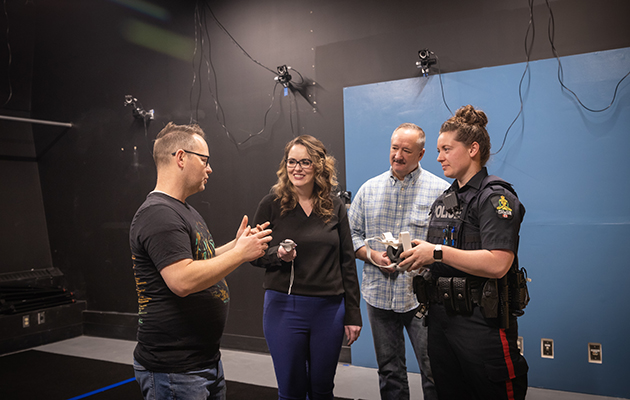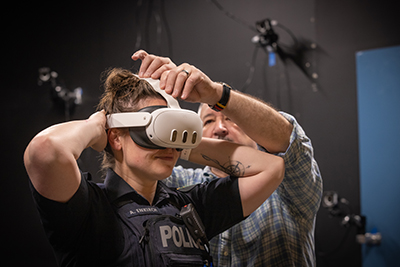Lethbridge Polytechnic has secured $360,000 in funding from the Natural Sciences and Engineering Research Council of Canada (NSERC) to advance its research into virtual reality-based assessment of police applicants.
The three-year grant, through the College and Community Social Innovation Fund, will assist the Centre for Public Safety Applied Research (CPSAR) to develop authentic virtual reality (VR) scenarios to test a potential officer's ethical decision-making abilities and other competencies.

Members of the CPSAR research team discuss a scenario with a police officer
Virtual reality allows for real-word assessment and training in dangerous scenarios with a reduced risk to users and reduced costs. Refinement of the immersive technology by polytechnic researchers with CPSAR and the Spatial Technologies Applied Research and Training (START) Centre could potentially open the door for even more applications in the public safety sector and beyond.
"The potential for its use is really limited only by a person's imagination," says Dave Maze, a Justice Studies instructor and project director.
Lethbridge Polytechnic's CPSAR research team have worked closely with industry partners to determine public safety needs, challenges and opportunities. Many partners identified a gap in their recruiting processes, as existing methods to assess ethical decision-making were found to be lacking. That skill is critical given the number of decisions police make daily, and the significant impact such choices can have on the public, the officer and their organization.
"When do you have the opportunity, as an applicant, to actually show what you would do in any given situation? What people will do and what they say they'll do are two different things," says Dr. Kirsten Fantazir, President's Applied Research Chair in CPSAR. "That's what the technology allows us to do."
Research last year introduced participating police agencies to the foundations of VR, its potential and limitations. The new funding will allow the polytechnic to develop more and varied immersive scenarios for review and feedback from the partners.
While VR training scenarios for first responders have been used elsewhere to a limited degree, Fantazir says they tend to be focused on tactical subject matter, and often feature "stereotypical caricatures and representations of people and interactions that are based out of the gaming world, which are highly biased and discriminatory."

Dave Maze helps an officer with a VR headset
Researchers will create culturally diverse VR scenarios using an intersectional approach to help recruits navigate situations relevant to various demographics. The authentic portrayal of community diversity will benefit from consultation with a Community Advisory Council, which represents 18 different underrepresented groups reflecting biological, behavioural, situational and cultural diversity.
The project partners - police services in Calgary, Camrose, Edmonton, Lethbridge, London, Ont., Tsuut'ina Nation, Brandon. Man., and West Vancouver - will be provided data to compare the effectiveness of current methods of assessing decision making with VR assessments, which may help determine if they pursue the technology.
Benefits to polytechnic students
The research will benefit Lethbridge Polytechnic students as well, including those creating digital characters and scenarios in VR. While many of those students come to the polytechnic with a background in gaming, they learn the biggest industry demand is creating training scenarios.
The project will provide students experience adapting real-world problems into a new medium and new technology, says Tyler Heaton, a research advisor and industry liaison with START.
"Hardware and software for development has become more accessible, but the design mindset is a bit trickier," says Heaton, lead designer on the project. "Students need the experience of being involved in a project that is being developed, so they can see those touch points and go, oh, that's why we're using VR.' "
Criminal Justice students will also gain invaluable experience, whether they're testing VR scenarios or collecting data. Maze says the Criminal Justice - Bachelor Degree program includes a strong research component, and those students involved will get additional training in that area so they can do a lot of the "heavy lifting" in the project.
"We have one student who's looking down the road at working in the analytical community with public safety, and all of this will certainly support her resume and the future plans that she has," he says.
Lethbridge Polytechnic offers more than 65 certificate, diploma, degree and apprenticeship programs and is ranked 16th in the latest ranking of Canada's top research colleges. Learn more at lethpolytech.ca.








